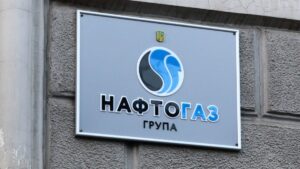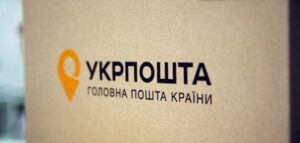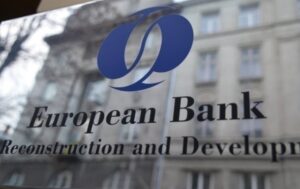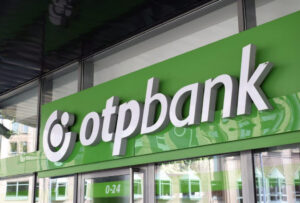
The Naftogaz Group and the European Bank for Reconstruction and Development (EBRD) have discussed financing the purchase of natural gas and supporting its production in the face of Russian attacks.
As the group reported on Friday, these issues were the focus of a meeting between Naftogaz CEO Roman Chumak and EBRD President Audrey Renaud-Basso. The event was also attended by EBRD Vice President Matteo Patrone, Managing Director for Ukraine and Moldova Arvid Turkner, and Deputy Head of the EBRD in Ukraine Iryna Kravchenko.
“Strengthening the country’s energy resilience in the face of a full-scale war, ensuring a stable heating season and providing all categories of consumers with gas are our key objectives. We are grateful to the EBRD for its support and continue to work together on financial instruments to ensure Ukraine’s energy security,” Chumak emphasized during the meeting.
He also added that in today’s environment, flexible and operational solutions in cooperation with international partners allow Naftogaz to respond quickly to crisis situations and ensure uninterrupted energy supplies.
As reported with reference to the Minister of Energy of Ukraine Herman Halushchenko, Ukraine will need to import at least 1 billion cubic meters of natural gas by the end of 2025.
At the same time, according to former Energy Minister Olha Buslavets, the country will have to import 2-3 billion cubic meters of natural gas in 2025 to cover the shortage.
According to her estimates, Ukraine should go through the heating season without serious gas supply restrictions, unless there are extreme frosts, but by the end of it, reserves in underground gas storage facilities (UGS) will amount to about 4.5-5 billion cubic meters, which means an additional need to import 2-3 billion cubic meters of gas by the end of this year.

As part of a joint project with the European Bank for Reconstruction and Development (EBRD) to develop logistics for implementation in 2025, Ukrposhta JSC has announced a tender for the purchase of 31 modular premises for post offices.
According to the announcement on the EBRD’s tender procurement portal, bids will be accepted until February 14, 2025.
As reported, as part of the EBRD-funded logistics development project, Ukrposhta announced several tenders for the purchase of vehicles at the end of last year, including the repeated purchase of 100 trucks and 60 tractor-trailers in November.
In October last year, tenders were announced for the purchase of 880 courier electric scooters and 1,745 electric postal tricycles.
The results of these tenders have not been made public.
Ukrposhta is the only national postal operator in Ukraine.
According to its website, its network covers more than 27,000 settlements in Ukraine, except for the temporarily occupied ones. It consists of 24 regional branches, the Directorate of Mail Processing and Transportation, and Avtotransposhta. The company’s vehicle fleet includes more than 5.3 thousand vehicles.

The European Bank for Reconstruction and Development (EBRD) provided almost EUR2.4 billion to Ukraine last year, up from EUR2.1 billion in 2023, a record high in the history of cooperation with the country, the bank said in a press release on Thursday.
“The Bank is the largest institutional investor in Ukraine, which has significantly increased its investments since the start of the full-scale Russian invasion in February 2022. The total amount of financing provided by the EBRD in Ukraine during the war is almost EUR 6.2 billion,” the statement said.
It is noted that the priority areas of the EBRD’s activities in Ukraine remain support for energy security, vital infrastructure, food security, as well as trade and the private sector. The press service clarifies that trade finance is taken into account in the total volume along with investments.
The EBRD plans to maintain its investments in Ukraine at around EUR 1.5 billion per year, with a potential increase during the recovery phase, following an agreement reached in 2023 to increase the bank’s capital by EUR 4 billion to EUR 34 billion.
“Our shareholders have shown tremendous confidence in us by approving a significant capital increase to support our operations in Ukraine and other war-affected countries. Most of all, I would like to see 2025 become a year of recovery. This is where the EBRD is able to make the most of itself – we use our financial expertise to help rebuild better than before,” EBRD President Audrey Renaud-Basso said.
It is specified that the total amount of financing provided by the EBRD in 2024 reached EUR 16.6 billion, which is 26% more than the previous record of EUR 13.1 billion in 2023.
The EBRD was founded in 1991. According to the latest data, the financial institution has invested more than EUR 21.29 billion in Ukraine since then. The current portfolio consists of 614 projects worth EUR5.58 billion.

The European Bank for Reconstruction and Development (EBRD) has signed an agreement with Ukraine’s OTP Bank (Kyiv), approved in early December, to cover up to 50% of the credit risk on the bank’s new EUR200 million loans, the EBRD said in a statement on Monday.
“This is the fifth and largest such loan agreement provided by the EBRD to OTP, building on the successful cooperation between the two institutions to date,” the release said.
It is specified that this will enable the bank to finance critical sectors such as agriculture, energy, manufacturing, and transportation.
The EBRD’s participation in the project, estimated at EUR 60 million, will be supported by first-loss risk coverage funded by donors, including the European Union (EU), under the UIF Ukraine Facility.
It is also noted that, taking into account this project, the total amount of financing under similar EBRD guarantees signed since the beginning of Russia’s full-scale war against Ukraine is almost EUR 2 billion.
Up to 20% of the project’s risk-sharing loans will be used to support long-term investments by private micro, small and medium-sized enterprises (MSMEs) in EU-compliant and green technologies that increase their competitiveness in domestic and foreign markets. Upon completion of the investment projects, these sub-borrowers will receive EU-funded investment grants under the EU4Business initiative, as well as technical assistance. The EBRD has already allocated EUR 66 million in grant support for Ukrainian MSMEs under the EBRD-EU4Business credit line, including EUR 5 million for projects through the TFP.
According to the bank’s website, the guarantees are planned to be provided in three tranches: two in the amount of EUR 22.5 million, each covering EUR 75 million, and one in the amount of EUR 15 million to cover EUR 50 million of the loan portfolio.
According to the National Bank of Ukraine (NBU), as of November 1, 2024, OTP Bank, a wholly owned subsidiary of the Hungarian OTP Bank, ranked 11th (UAH 116.9 billion) in terms of total assets among 62 banks in the country. The financial institution’s net profit for 10 months of last year amounted to UAH 4.82 billion.
Since Russia’s invasion in 2022, the EBRD has lent more than EUR 5.4 billion to Ukraine, including more than EUR 1.6 billion last year.

The European Bank for Reconstruction and Development (EBRD) and global insurance and reinsurance broker Aon have announced the launch of a specialized program aimed at restoring the activity of the military risk insurance market in Ukraine, under which the EBRD provides guarantees of EUR 110 million.
“The Bank’s partnership with Aon will help to restore the activity of international reinsurance companies in the Ukrainian military insurance market. The Bank’s new guarantee will improve the access of private sector insurance companies to reinsurance, which will lead to overcoming the current challenges caused by the war,” the EBRD said in a press release on Thursday.
According to it, the program will involve the international reinsurance company MS Amlin and Ukrainian insurance companies INGO, Colonnade and UNIQA. It is specified that the initiative is supported by donors, including France, the United Kingdom, Norway and the Taiwan-Business-EBRD Technical Cooperation Fund.
Under a new EUR110 million guarantee program for Ukraine’s recovery, the EBRD will provide international reinsurance companies with a guarantee to cover certain war-related risks insured by Ukrainian insurance companies. The program will utilize existing market infrastructure and proven insurance industry mechanisms to provide the protection required by private sector investors, the release said.
It is stated that Russia’s full-scale invasion of Ukraine in February 2022 led to a significant restriction of access to reinsurance services, as international companies have largely ceased to operate in the Ukrainian market. This, in turn, has significantly limited the ability of Ukrainian insurance companies to offer commercial insurance products against military risks.
It is emphasized that the new program is the first program of its kind and will operate as an open platform through which various insurance market participants will be able to access the guarantee. Global specialized reinsurance company MS Amlin is the first international partner in this market to join the bank’s program. Thanks to this program, this British company will be able to reduce the amount of relevant liabilities on its balance sheet, which will allow it to resume active cooperation with Ukrainian insurance companies to provide much-needed insurance for military risks.
It is specified that at the initial stage, the program will cover insurance of land freight transportation, damage to vehicles and railway rolling stock. In the future, it may be expanded to cover other types of property, taking into account market needs.
Given that such policies are typically short-term, the program is designed to reuse capital to achieve aggregate coverage that will exceed the guarantee amount many times over, depending on the actual number of policies sold and the frequency of claims, the EBRD said.
“According to preliminary estimates, based on this approach, the bank’s guarantee can provide insurance coverage totaling up to EUR1 billion of goods and vehicles per year, which will have a significant economic impact,” the EBRD predicts.
It is also noted that the European Union and Switzerland have promised additional donor support. According to the release, the EBRD and Aon worked in close coordination with the Ministry of Economy and the National Bank of Ukraine to prepare the program, in particular to ensure complementarity between the new initiative and other programs offered by other international organizations and the Ukrainian government, with the aim of expanding war risk insurance for Ukrainian companies and strengthening the Ukrainian economy.

On Wednesday, the Board of Directors of the European Bank for Reconstruction and Development (EBRD) approved a loan of up to EUR80 million to Ukrnafta under state guarantees for the construction of about 100 MW of small gas-fired distributed power plants and cogeneration facilities. According to the bank’s website, the loan will help solve the problem of electricity shortages and ensure uninterrupted power supply to households and businesses.
The total cost of the project will be EUR103.8 million, and it will also be financed by a grant of up to EUR22 million expected to be provided by the Netherlands, the United States and other donors through the EBRD’s Special Crisis Response Fund, as well as a technical support grant of EUR1.8 million from other donors.
“Ukrnafta is Ukraine’s largest oil producer and operator of the national network of filling stations. In March 2024, the company took over the management of Glusco’s assets and operates 547 filling stations – 462 owned and 85 managed.
The company is implementing a comprehensive program to restore operations and update the format of its filling stations. Since February 2023, the company has been issuing its own fuel coupons and NAFTAKarta cards, which are sold to legal entities and individuals through Ukrnafta-Postach LLC.
“Ukrnafta holds 92 special permits for commercial development of fields. It has 1832 oil and 154 gas production wells on its balance sheet.
Ukrnafta’s largest shareholder is Naftogaz of Ukraine with a 50%+1 share. In November 2022, the Supreme Commander-in-Chief of the Armed Forces of Ukraine decided to transfer to the state a share of corporate rights of the company owned by private owners, which is now managed by the Ministry of Defense.